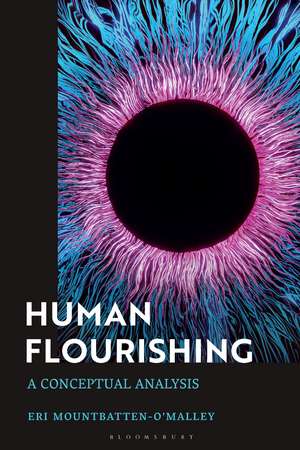Human Flourishing: A Conceptual Analysis
Autor Eri Mountbatten-O’Malleyen Limba Engleză Hardback – 15 mai 2024
Preț: 511.57 lei
Preț vechi: 594.85 lei
-14% Nou
Puncte Express: 767
Preț estimativ în valută:
97.90€ • 102.34$ • 82.73£
97.90€ • 102.34$ • 82.73£
Carte tipărită la comandă
Livrare economică 06-20 martie
Preluare comenzi: 021 569.72.76
Specificații
ISBN-13: 9781350418882
ISBN-10: 1350418889
Pagini: 272
Ilustrații: 10 bw illus
Dimensiuni: 156 x 234 x 25 mm
Greutate: 0.57 kg
Editura: Bloomsbury Publishing
Colecția Bloomsbury Academic
Locul publicării:London, United Kingdom
ISBN-10: 1350418889
Pagini: 272
Ilustrații: 10 bw illus
Dimensiuni: 156 x 234 x 25 mm
Greutate: 0.57 kg
Editura: Bloomsbury Publishing
Colecția Bloomsbury Academic
Locul publicării:London, United Kingdom
Caracteristici
Argues why we should pay closer attention to human contexts, purposes and uses in conceptions of flourishing
Notă biografică
Eri Mountbatten-O'Malley is Senior Lecturer in Education Policy at Bath Spa University, UK.
Cuprins
List of FiguresPrefaceAcknowledgements List of Abbreviations Introducing the Problem1. Normativity, Language and Concepts2. On the Analysis of Concepts 3. Humanness 4. A Sketch of Human Flourishing 5. 'Human' Agency 6. Personal Growth and Development 7. Summum Bonum: Happiness and Meaning Concluding Remarks NotesBibliography Index
Recenzii
This book is original, insightful, and provocative. It utilizes key insights from Wittgenstein and ordinary language philosophy to rigorously analyse the widely used but contested concept of flourishing. Its conclusions cannot be ignored.
Eri Mountbatten-O'Malley has seized upon Wittgenstein's ideas and methods and used them to shed much needed light on the notion of human flourishing as deployed in education, psychology and political debate. His criticisms of essentialism, subjectivism, reductionism and scientism are powerful and persuasive. His advocacy of civilised humanism in the face of its numerous adversaries is laudable.
Human flourishing is one of the most important intellectual concepts of our time. Eri Mountbatten-O'Malley has taken a deep dive into philosophical waters. Readers expecting a simple answer will not find it here, instead we are challenged to think again about the nature of human flourishing. Educators, psychologists, and policy makers, anyone interested in human flourishing, are invited to explore its philosophical foundations. This book is a welcome addition to my library and practice.
Drawing inspiration from Wittgenstein, Mountbatten-O'Malley unravels a myriad of confusions in the current literature on human flourishing with commendable precision. He provides a clear and illuminating map for readers to navigate this often perplexing terrain, offering a fresh perspective on the vital interplay between personal and social responsibility in the pursuit of human flourishing. The book successfully bridges the gap between theory and practice and is a must-read for anyone seeking to explore and enrich their understanding of what it takes to flourish.
Eri Mountbatten-O'Malley has seized upon Wittgenstein's ideas and methods and used them to shed much needed light on the notion of human flourishing as deployed in education, psychology and political debate. His criticisms of essentialism, subjectivism, reductionism and scientism are powerful and persuasive. His advocacy of civilised humanism in the face of its numerous adversaries is laudable.
Human flourishing is one of the most important intellectual concepts of our time. Eri Mountbatten-O'Malley has taken a deep dive into philosophical waters. Readers expecting a simple answer will not find it here, instead we are challenged to think again about the nature of human flourishing. Educators, psychologists, and policy makers, anyone interested in human flourishing, are invited to explore its philosophical foundations. This book is a welcome addition to my library and practice.
Drawing inspiration from Wittgenstein, Mountbatten-O'Malley unravels a myriad of confusions in the current literature on human flourishing with commendable precision. He provides a clear and illuminating map for readers to navigate this often perplexing terrain, offering a fresh perspective on the vital interplay between personal and social responsibility in the pursuit of human flourishing. The book successfully bridges the gap between theory and practice and is a must-read for anyone seeking to explore and enrich their understanding of what it takes to flourish.
